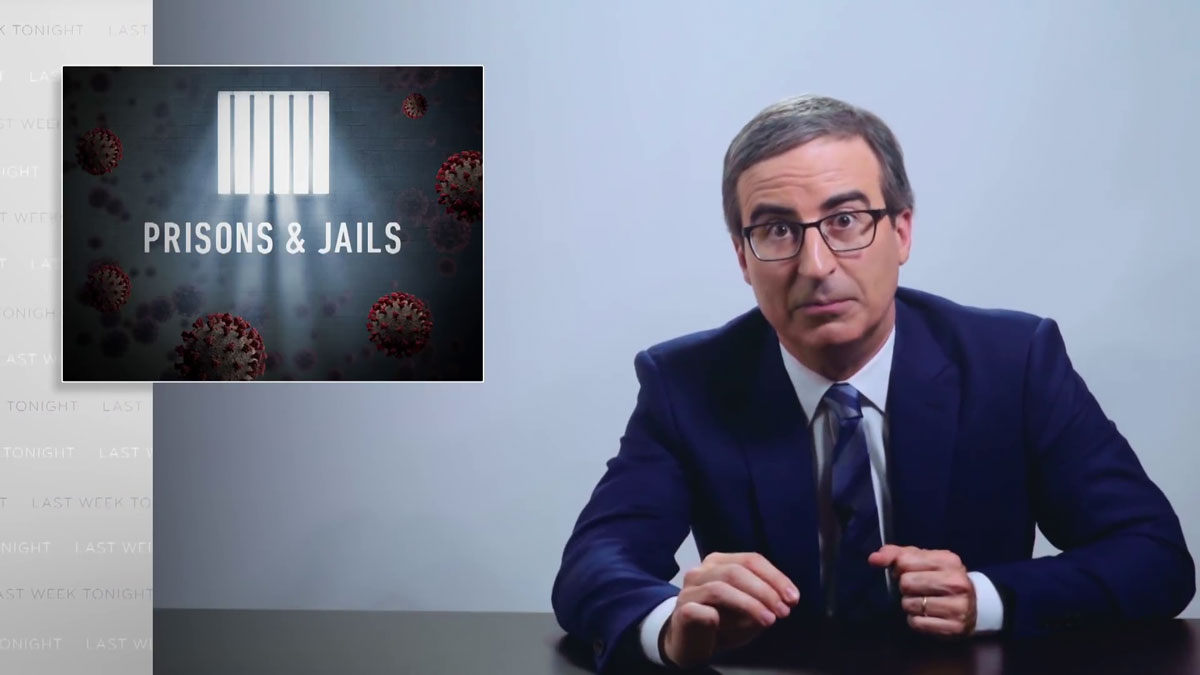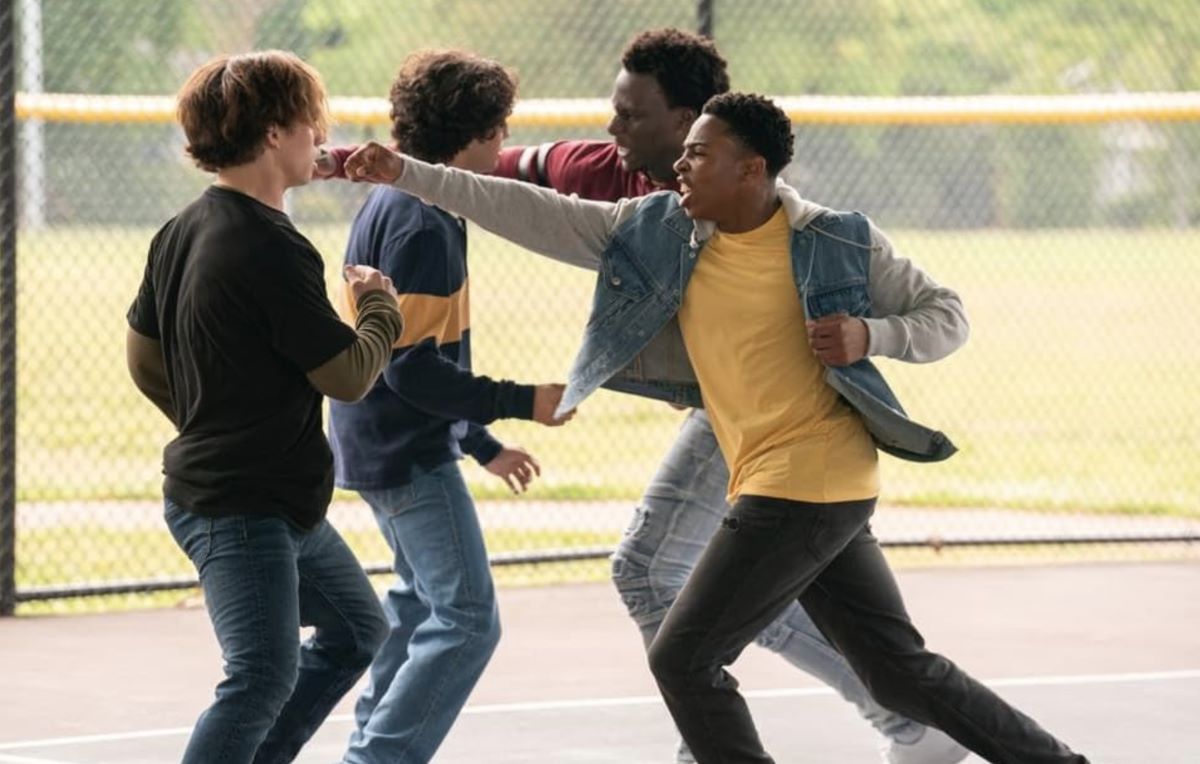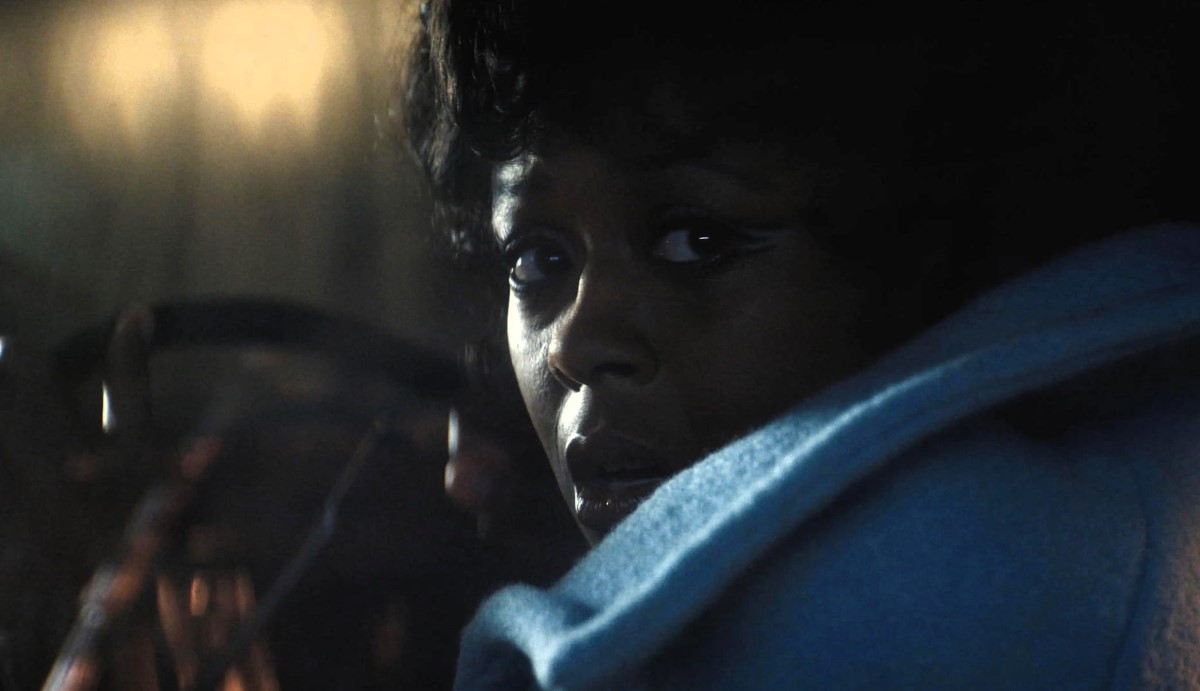As US prisons and jails see an alarming spike in COVID-19 infections, John Oliver discusses why the virus has spread so rapidly behind bars and what we can do to stop it.
Our main story tonight concerns the coronavirus—you know the thing you have to regularly convince your parents still exists—”Oh you went to a Shoney’s, did you? Who else was there? The whole town? Wow… please stay inside you extremely fragile maniacs.”
In recent weeks there’s been a series of alarming spikes all over the country, but one particular kind of place as we getting hit especially hard.
Prisons are seeing an alarming spike. Data collected by the New York Times shows the number of inmates infected is above 68,000. That’s doubled over the last month. Prison deaths tied to the virus have risen by 73 percent since mid-May. The five largest known clusters of the virus are in correctional institutions.
Yeah, it’s true. The five largest clusters of coronavirus are correctional institutions—which is so terrible. It sounds like an announcement produced by some sort of bad news generator that spits out random sentences like “Confederate statue inks 10 episode deal with Quibi”, or “TikTok hamster charged with four counts of vehicular manslaughter,” or “Sean Hannity dating Ainsley Earhardt”—one of those is real and it’s the worst one.
And the facts the coronavirus is rampaging through prisons and jails is especially alarming given that there are 2.2 million people being held in them across the country. And inmates are generally a group with higher health risks. Between 1999 and 2016, the number of people 55 or older in prison has increased 280 percent, and people inside jails are more likely to be immunocompromised with chronic health issues like diabetes and hypertension. So this is an immensely vulnerable population, and inmates very much know that, as these advocate explains:
[Louis Reed, National Organizer, #Cut50] I personally am in contact with more than 300 people who are incarcerated. They report to me day in and night out—”Louis, this is like me standing in the middle of i-95 in New York, right in the middle of the road and cars zipping by me at a hundred and seventeen miles an hour in both directions, and it’s just a matter of time before I’m hit with this thing.”
Yeah, inmates feel like it’s just a matter of time before they get sick, which is terrible because we don’t punish people by giving them diseases. Take me for instance, I don’t have Lyme disease because of my 2008 public intoxication charge, no I have it because those deer knew how to fucking party back then—I’ve got to be honest, I miss that crew.
So tonight let’s talk about a few things: why the corona virus has spread so rapidly behind bars, the impact that has on absolutely everyone, and what we can and should be doing about it.
And just as a quick refresher, jails are where people are detained while awaiting trial, or held for minor sentences, while prisons typically hold people who’ve been convicted and are serving sentences of more than a year. And whether you’re in a jail or a prison, you are probably in a facility that is in no way built to cope with a crisis like this. Because it’s basically impossible to keep six feet apart in a tiny cell, as Ted Koppel found out a few years ago.
[Ted Koppel] Confinement and social distancing are mostly incompatible.
“You don’t have a hell of a lot of room here, do you?”
[Inmate] “You don’t. You can only slide– one person can only move at a time– like, if I’m– this is– you have to turn sideways…”
Right, it’s hard to practice social distancing when you live in what’s basically a closet with two beds and a toilet—in fact I’d argue you can’t practice most things under those circumstances, apart from games “like let’s try not to accidentally hug each other” and “who can poop the quietest.” And incidentally the correct answer to that last question is Blake Lively—she poops the quietest, that is simply a fact.
And some of the steps authorities have taken to deal with this problem are ridiculously small, as this worried mother of one prisoner explains:
“They’re being locked down for like twenty three and a half hours a day. They get to come out for like ten minutes and use the phone and you, you know, take a shower and then go back in. And those small cells there telling them sleep from head to foot. But, I mean, even from head to foot, if you’re in a small cell it doesn’t make a difference.”
Exactly, and that’s probably not comforting for a mother to hear, is it? “Oh don’t worry mom, all prisoners are instructed to sleep head to foot, and when they’re awake we tell them to breathe in opposite directions, we’re pretty sure we’ve got this covered.
Then there’s the simple issue of soap. As everyone knows by now a key way to protect against the coronavirus is by regularly washing your hands. But in jails and prisons soap maybe rationed, or not available at all, and if inmates need more they may have to buy it from the commissary and, as we’ve covered before on this show despite, doing most of the work to keep prisons and jails running, inmates only make pennies for their labor. In fact, some facilities have even posted signs about the importance of hand washing, but then continued to charge inmates for access to soap. And multiple prisoners have felt they needed to go out of their way to try and alert the world to this dangerous shortage.
“This is what they gave us, there’s little tiny soap, not enough to stay clean, to wash our hands, and this for only two weeks.”
“They are not giving us hand sanitizer. They’re not giving us proper soap.”
“This is the soap’s dish that’s in our bathroom. It’s just pieces of soap that everybody gotta wash their hands with. We have two soap dispensers, but sometimes on a weekend the soap runs out–“
That is clearly awful, there should always be enough soap. And I know, if you wanted to do a decent parody of me you wouldn’t be too far off if you slapped on a suit, faked a British accent, and went around shrieking “there should always be enough soap.” But that doesn’t make it any less true, does it? There should always be enough fucking soap, and especially at that last facility, at which, as of April, about 80% of its residents had contracted the virus.
And is by no means just cleaning products that are scarce. PPE is in such short supply that it’s led to prisoners wearing socks on their hands when they use the phone—which might be the saddest sock puppet ever.
And testing has been so lacking that inmates can’t be confident about who does and doesn’t have the virus. And on top of that, if someone does show symptoms, they’re often placed in solitary confinement because prisons have nowhere else to quarantine them. And it’s not a great incentive for inmates to come forward. If your policy is basically “look, just tell us that you’re sick, and we’ll put you in this special punishment hole.”
And when you take all of this together—the close quarters, the lack of basic protections, and the uncertainty about the spread of a potentially deadly virus—it’s honestly no surprise that tensions can hit a breaking point.
“This is what happens when the fucking coronavirus is killing us.”
Just after 3 o’clock, Thursday afternoon, an inmate took cell phone video inside the C block of the Lansing Correctional Facility. Property destroyed, inmates out of their cells. Inmates complaining of the conditions during Covid-19.
Yeah, I mean anyone is thinking that that’s an extreme response I’d simply ask this: what else are they supposed to do? What other bargaining chip do prisoners have at their disposal right now?
This is actually being a bit of a recurring theme lately, but I’ll say it again, if it takes the destruction of property for a system to pay attention to human lives, then we are in a dark fucking place.
And I know that if you are fortunate enough to have little to no familiarity with the prison system, it can be easy to ignore this problem, and that issue is actually reflected by some in local government.
In California, when an outbreak in a Santa Barbara prison made it difficult for that County to meet the state standards for reopening, local officials proposed simply not counting the prisoners, with a county spokesman saying “the individuals are not out in the community.” So it’s really a whole separate population, which is the kind of thing you should only really be saying if there was a Coronavirus outbreak in Atlantis—”Look, they don’t even breathe air down there, they’re really a whole separate population.”
And the director of the Arkansas Department of Health trying to put an even more optimistic spin on the prison outbreaks that they were having there:
[Dr. Nate Smith] These are high-risk settings we’re covered 19 can spread very easily very rapidly, but they’re also closed systems and they don’t necessarily represent the situation in Arkansas in general. A fortunate thing about that kind of setting is that it’s not that hard to contain it because people aren’t going out and about, they’re not they’re not leaving the prison.
OK, even if prisons and jails were closed systems—which they are very much not for reasons we’re about to get into—it’s weird to call outbreaks of a deadly virus “fortunate” just because they’re confined to one place. The news didn’t go insane covering balloon boy because they were stoked it was just one boy he contained in a homemade balloon careening through the sky—no it was treated as an emergency because there was a chance he was gonna fucking die. Thankfully, of course, there turned out to be zero boys in that balloon, as it was later revealed to be a hoax pulled off by the boy’s parents in order to make the family who had appeared on the reality show Wife Swap more marketable to the media and—holy shit—remember when Balloon Boy was the craziest story you had to worry about? 2009 truly was a simpler time to be alive.
And look, for the record people are absolutely going out and about from prisons, because not everyone in a prison is in prison. There are around 445,000 non-inmate staff personnel working in prisons across the country, and those workers have reported over 9,000 coronavirus cases. We might as well be handing them coronavirus gift bags as they leave work every day, and head back out into the community.
And staff bringing the virus in and out of facilities isn’t the only way that it can spread. It can hop from prison to prison, as inmates are transferred around, and it can also get out into the community when sick prisoners are treated at local hospitals, particularly in rural areas where hospitals can easily get overwhelmed. And that is before we get into jails where there is a constant churn of people moving in and out. In a typical week, more than 200,000 people are booked into jails across the country, and another 200,000 walk out. So, outbreaks in prisons and jails can easily spread to the larger community. In fact, one study suggested that, as of mid-April, more than 15% of all documented coronavirus cases in Illinois could be linked to just one facility, the Cook County Jail.
And while the jail strongly disputes those findings, there were activists who saw the danger signs early on, like this man who was warning people back in March:
[Eric Russell, Criminal Justice Reform Activist] As of right now, Cook County Jail is a virtual petri dish. Cook County Sheriff Tom Dart he is the captain of a death cruise ship.
Wow, a death cruise ship. Look, cruise ships are already comfortably bad enough without bringing death into the equation—it’s like if our parent company re-branded themselves as “Genocide AT&T.” Guys, guys, I don’t know how you could possibly make a worse experience than the one that you’re already providing people.
The point here is coronavirus doesn’t stay behind bars, it travels easily, which actually brings us to our final question: What can we do? Well, realistically we need to be getting as many people out of prisons and jails as possible—which is frankly something we should be doing anyway—but right now we really don’t have much of a choice. The fewer people in these facilities, the easier it will be for those people to socially distance, the fewer staff you’ll need on-site, and the lower your demand for PPE.
But of course when releasing inmates this is the inevitable response:
[Texas State Senator Paul Bettencourt] The public just doesn’t wanna have a thousand burglars, thieves, and, you know, identity forgers, and others out on the street. We got enough problems watching homes and business purses and wallets right now, we don’t need any more of this.
All right, first off, taxidermied George Lucas, you seem to be struggling to think of more than one kind of criminal there. Burglar, thief, and identity forgers—those are all just synonyms for stealing, what about all the other criminals in Texas, like the man who posed as Beto O’Rourke volunteer, broke into someone’s home, and took a popsicle, or the man who was forced to return three thousand dollars in prize money for cheating in bass fishing contests, or even the woman who drank wine out of a Pringles can while driving an electric cart around a Walmart parking lot for several hours. Texas has a vibrant crime scene with a lot more variety than your frankly giving it credit for. An I dog you that there are some people we have no excuse for not releasing immediately, especially those awaiting trial in jail who pose little risk to public safety and are only there because they couldn’t afford to post bail.
And look, I am not saying that every person who’s let out due to the Coronavirus will behave perfectly—no one can say that. And I’m sure that you will see people on TV excitedly citing isolated cases of people who were released, and then did bad things. You’ll see that on shows like “Crime Porn for Old Whites with Laura Ingraham” or “They’re Coming for You!” with a Human Squash Court. But on balance, the risks of carefully letting people out are vastly outweighed by the risks of leaving everyone in sight. As for prisons, the bare minimum we should do is release offenders who’ve served the majority of their sentences, particularly the immunocompromised and the elderly. Those groups are at high risk for the virus and the elderly are also a very low risk to re-offend. You can also place certain prisoners on furlough, basically pausing their sentence and having them return to finish it once the pandemic is under control, or you can place them under house arrest.
And at the national level to his—and I cannot believe I’m going to say this—credit, attorney general part released a DOJ memo instructing federal prisons to reduce their populations—which sounds like a great idea, in theory—but to date they’ve only done that by around three percent, which is even worse than the typical state prison because they’ve reduced their population by just 5 percent, and that’s simply not enough. And I know this might put you in the uncomfortable situation of having to argue on behalf of people that you might not find inherently sympathetic—take the case of one federal prisoner who pushed hard to be released:
[Weny News] A judge has rejected convicted pharmaceutical executive Martin Shkreli’s requests to be let out of a prison to research a coronavirus treatment. The presiding judge noted that probation officials viewed that claim as the type of, quote, “delusional behavior that led to his conviction in the first place.”
Yeah, Martin Shkreli, the farmer bro tried to get released to home arrest so that he could work on developing a cure for the coronavirus, presumably so he called it Rona Juice and then sell it for five thousand percent more than it should cost, and he was denied. And when you hear that you might think “good, fuck that guy,” and generally, “yeah, fuck that guy,” but in this instance—despite the fact that Martin Shkreli is an attention-starved tree frog who clearly wasn’t held enough as a tadpole, and despite his reasoning for why he should be released being complete bullshit—I don’t want him to contract the virus and potentially die from it—I don’t want that for anyone, none of us should.
And yet, right now millions of Americans are currently stuck in truly desperate straits and vastly disproportionately people of color. And some prisoners have become so desperate they will risk punishment to try and get anyone in the outside world to pay attention to their situation. Just watch this prisoner openly using a contraband cell phone—which he knows will lead to consequences—to try and raise an alarm:
“This over here dying from corona– they’re literally leaving us to die.”
This is Aaron Campbell. he’s an inmate at FCI Elkton, a low-security federal prison in Ohio. He’s using a contraband cell phone, and he knows he’s gonna get in trouble for making this video.
“So I was like, fuck it, trying to keep this phone situation low key. But like, this shit is serious as fuck. Everybody in this bitch is dying and like, what the fuck y’all want me to do? Die in this bitch?”
No, I absolutely do not want that. And I have to tell you, the authorities at that prison have said that the men in that video were actually completely fine and neither was sick, although you should also know that by the government’s own count at that one low security institution more than six hundred inmates have tested positive for coronavirus and nine have died.
And if you’re wondering how that prisoner was doing, he’s reportedly been in solitary since that video went viral in early April. And he wrote a letter to a reporter saying that officials told him he wouldn’t face additional discipline if he issued a statement saying the video was fake—a request he then refused, which is incredibly brave. And that’s coming from me, a man who was never missed an opportunity to say “I’m sorry” for literally anything. So at this point it’s worth asking: What the fuck are we doing here?
Particularly during this pandemic, but also in general because there’s obviously a much larger discussion to be had about how millions of people ended up incarcerated in the first place, and whether or not prisons even work, which I would argue they absolutely do, if your only goal is to have a lot of people in prison. The fact is we should be depopulating prisons and jails as quickly as we can right now. And I know how that sounds because we were all raised hearing that you shouldn’t do the crime if you can’t do the time, but in our current system you’re never just being sentenced to time. You’ve been sentenced to a lifetime of social stigma, futile job interviews and roadblocks to necessities like housing. All of that is immoral enough. There is frankly no reason whatsoever we should now also be sentencing people to die from a virus because that’s not justice, it’s neglect. And it really matters because as much as we’d like to pretend that incarcerated people are a separate population, they’re not. Whatever they’ve done, they are still members of our society and if this horrific year has taught us one thing is that we are all on this death cruise-ship together.





